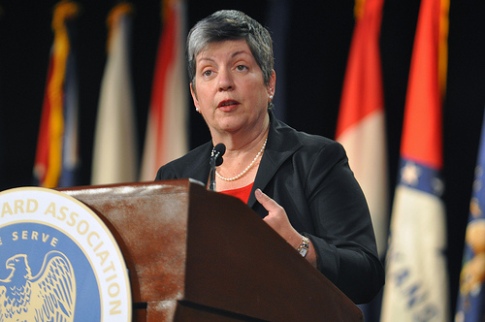As the reactionary Michelle Malkins of the conservative blogosphere foam at the mouth over Secretary of Homeland Security Janet Napolitano’s comment on CNN’s John King’s State of the Union about the “criminality” of crossing the border, Napolitano is busy with real work laying out five areas of focus for the Department of Homeland Security (DHS).
Numerous ill-informed, “gotcha-style” bloggers continue to misinterpret Secretary Napolitano’s Sunday morning comments in which she asserted that DHS needs to target real criminals and judiciously use law enforcements’ time and resources:
What we have to do is target the real evil-doers in this business, the employers who consistently hire illegal labor, the human traffickers who are exploiting human misery. And yes, when we find illegal workers, yes, appropriate action, some of which is criminal, most of that is civil, because crossing the border is not a crime per se. It is civil. But anyway, going after those as well.
Conservative bloggers went berserk, mostly because A) they don’t understand immigration law and B) they weren’t listening and C) they’re just looking for a reason to cry “shamnesty” instead of being productive and suggesting sensible solutions. As Joshua Holland points out in his post on alternet.org, most undocumented immigrants in America don’t cross the border illegally (which is a crime), but enter legally and overstay their visas (a civil offense, as Napolitano correctly pointed out).
Bloggers cite the U.S. criminal code and point out that entering the country illegally — evading a border check-point, presenting false ID, that stuff — is a federal misdemeanor. Which is true. But Napolitano had said that “crossing the border is not a crime per se,” and she’s 100% correct. …Around half of the “illegal immigrants” in this country (the exact number varies by study) entered legally and stayed when their visas expired. Being here without papers is a civil violation, not a criminal offense.
Secretary Napolitano could have clarified her statement with an explanation about the difference between criminal and civil offenses as applies to immigration law, but the fact of the matter is that it’s intellectually dishonest to parse her words in order to tarnish her credibility. People are allowed to disagree with her politics and policies, but not fold her up into a rhetorical punching bag for something she didn’t say.
Meanwhile, Napolitano thoughtfully outlined five DHS mission areas at an Anti-Defamation League Leadership Conference on Tuesday—following up on the directive she ordered back in January—fighting and preventing terrorism; securing the borders; enforcing and overhauling immigration laws to work more effectively; improving preparation for recovery from natural disasters; and fostering a common culture within DHS. She even commits to completing the border fence that Congress has appropriated money for, but within the context of a more comprehensive approach, like adding adequate technology, boots on the ground and interior enforcement.
Most notably, however, Napolitano plans on implementing these missions in an imperfect immigration system—one that she acknowledges needs a large overhaul vastly different from the Bush administration’s enforcement-only approach and an overhaul that she is diligently preparing DHS for:
[We need] to be prepared, when the President and the Congress decide the time is right to implement or to provide advice on comprehensive immigration reform; but until then, to within our own administrative capacity institute smart, tough immigration reforms. How you enforce the immigration laws that we have is very, very important. … I think the President has been very clear that he wants to move forward, that he is not interested too much in focusing on what was done in the prior administration.
FILED UNDER: Department of Homeland Security, Restrictionists, undocumented immigration


